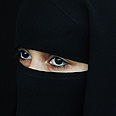
Muslim niqab
צילום: AFP
Canada rules on wearing religious veil in court
Supreme Court weighs in on religious freedom versus right to fair trial when female Muslim witness asks to wear niqab in court
A female witness can wear a religious veil that covers her face while testifying in court in certain circumstances, the Supreme Court of Canada ruled Thursday in a split decision in a landmark case that pitted religious freedom against an accused person's right to a fair trial.
The case involved a Muslim woman who sought to wear the veil known as a niqab, which leaves only the eyes exposed, while testifying against her uncle and a cousin whom she claims sexually assaulted her when she was a child.
Related Stories:
The woman, who can only be identified as N.S. due to a publication ban, said her religious beliefs dictate that she wears the veil in public or in the presence of men who aren't "direct" members of her family.The two accused claimed that the Charter of Rights and Freedoms allowed them to confront their accuser and observe her facial expressions as she testifies.
But the woman's lawyers said facial expressions can be misleading. They said Muslim sexual assault victims will hesitate to go to police if they're barred from wearing a niqab while testifying in court.
Canada's version of the bill of rights protects the right to wear the niqab or burqa, but the issue remains controversial. New federal immigration rules, for example, ban face coverings while taking the oath of citizenship
While Canadian courts at times allow complainants to testify from behind screens in courtrooms or via closed-circuit television, the woman's request to wear a veil was turned down in 2008 by a preliminary trial judge who ordered her to remove the niqab before testifying. The woman appealed.
In the rare 4-2-1 split decision, the Supreme Court referred the matter back to an Ontario trial judge.
The high court outlined considerations that trial judges must consider: Would requiring the witness to remove the niqab while testifying interfere with her religious freedom? Would permitting the witness to wear the niqab while testifying create a serious risk to trial fairness? Is there a way to accommodate both rights?
Lawyer Faisal Bhabha, who prepared written arguments on behalf of the Canadian Council on American-Islamic Relations, told The Associated Press he was happy with the ruling because it affirmed the equality of Muslim women who wear the niqab and of their centrality in the justice system.
"The most important principle is that the court has rejected outright any idea of an absolute ban or any idea that in order to maintain principles of secularism or neutrality that somehow means a woman should be forced to remove something that she wears for religious purposes," he said.
Muslim community leaders and scholars have debated whether the niqab is truly required by the faith.
"There should be no legal presumption that a witness that wears a niqab in a courtroom is doing so for a religious reason," argued Tyler Hodgson, the lawyer for the Muslim Canadian Congress, which was granted intervener status in this case.
- Receive Ynetnews updates directly to your desktop










